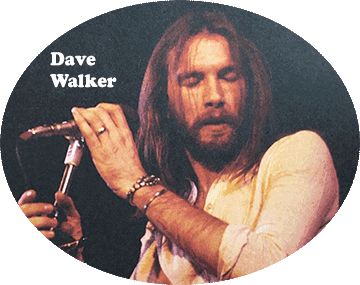
Dave Walker
"Hellbound Train"
Updated April 2025
If there's someone who might qualify for having an interesting life story, then surely Dave Walker's name would come close to the top of that list. As a career musician, Dave was there from the start of the 1960s from which he went on to become involved with several ground-breaking and influential bands.
It was Dave's ability as a charismatic vocalist and front-man that provided his greatest asset when performing on stage. His love of the blues provided inspiration that has served him well over the decades and while he no longer lives a "life on the road" his journey is not over yet as you will see...
The Redcaps
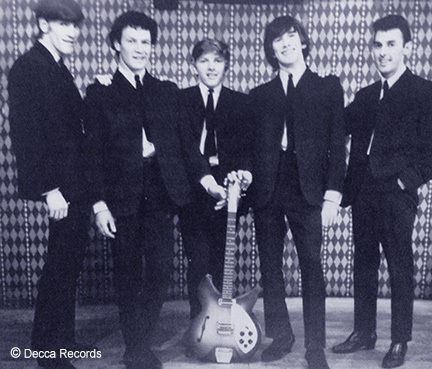
Born on 25th January 1945 and raised by his grandparents, David Walker's life changed forever when he first saw Elvis Presley perform on British TV. This inspired Dave to form his first rock 'n' roll band called The Redcaps along with his twin brother Mick in the "Black Country" town of Walsall during 1960.
Dave and Mick teamed up with two other brothers, Roy and Ronnie Brown, with the group's name inspired by "Gene Vincent and his Blue Caps". Dave Walker became their lead singer and also played rhythm guitar. The group gained a large following of fans after getting featured regularly at Joe and Mary Regan's "Old Hill Plaza" where they met and performed on the same bill as The Beatles on more than one occasion!
The Redcaps were one of the busiest groups around and toured up and down the UK. For example, a single week in May 1964 had them performing in Leicester on Sunday, Liverpool's famous "Cavern" on Tuesday, Bristol on Wednesday, the "El Toro" in London on Thursday, Poole on Friday, and Wimbledon on Saturday! They were also one of the first West Midlands groups to secure a recording contract on the mighty DECCA label. Dave is shown second from right in this Redcaps publicity photo.
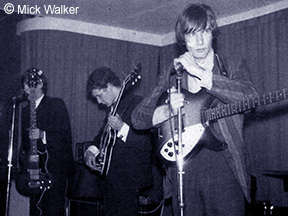
The Redcaps energetic recording of the Isley Brothers 'Shout' issued in August 1963 should have been a hit in the UK but it was Lulu's version on the same label that made the Top Ten the following year. However, The Redcaps enjoyed local success and were much admired by other bands in the same way The Spencer Davis Group influenced so many of the area's young musicians. Dave Walker would later say; "I was influenced very early on by black American singers".
The Redcaps split in 1965 with Dave Walker then forming a line-up called Beckett to include former Bruisers drummer Don McGinty. They performed locally including a regular spot at Birmingham's famous "Rum Runner" that was also managed by Dave's brother Mick. One local musician recalled; "Dave was great but always trouble, especially when Mickey was with him. They'd take on anyone!" From there, Dave went on to front the Brum soul band Traction who had a big sound and up to fourteen members on-stage!
Idle Race
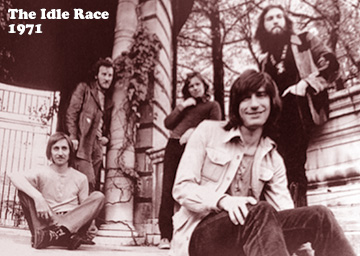
In 1970, Dave Walker went under management of the formidable Don Arden when he joined the acclaimed Idle Race as replacement for Jeff Lynne who had teamed up with Roy Wood in The Move. This well-established group, who had evolved from Mike Sheridan's Nightriders, had already recorded several singles and a couple of albums along with high-profile appearances at festivals and live radio performances.
Despite much touring with Dave and the release of a new album in 1971, the Idle Race were unable to manage a breakthrough hit record. Two tracks on their "Time Is" LP that were titled 'And The Rain' and 'Alcatraz' were co-written with Dave Walker.
Idle Race founding member Dave Pritchard left the band following the release of their last album and Dave Walker decided to leave not long after. The group continued on for a few more years with changing line-ups until remaining original member Roger Spencer left to join the Brum cabaret band Sight and Sound. The final line-up of Idle Race then became "The Steve Gibbons Band".
Savoy Brown
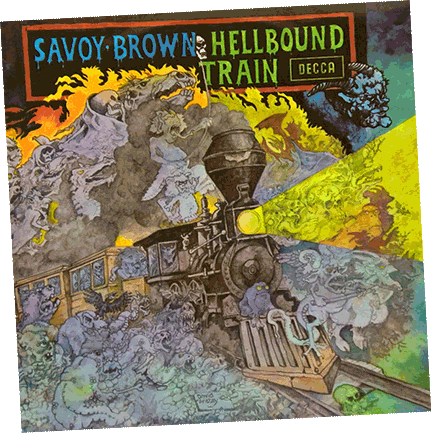
Dave Walker's bluesy vocal talent did not go unnoticed as in 1971 he got the job of fronting the UK blues/rock band "Savoy Brown" who were at that time making an impact in North America. Dave recalled; "I met Kim Simmonds after I had jammed one night up in Birmingham with John Bonham, a couple of guys from Fairport Convention, and Stan Webb from Chicken Shack. Stan was managed at the time by Harry Simmonds who also managed Savoy Brown. I was recommended by Stan and passed the audition!"
Savoy Brown under leadership of guitarist Kim Simmonds, underwent many changes of personnel but the line-up with Dave Walker (that also included former Chicken Shack members) was the most commercially successful. This period with Dave in the band yielded their biggest selling albums "Street Corner Talking" and "Hellbound Train" that were popular in the U.S.A. and Canada where the band toured consistently.
The Savoy Brown album "Live in Central Park" that was recorded in 1972 but not issued until many years later, features the Dave Walker line-up of the band. It is regarded by many fans to be one of their best. Despite their success in North America, Savoy Brown never gained the same recognition in the UK.
Savoy Brown were touring America with the hit group Fleetwood Mac during the spring of 1972. Their vocalist/pianist Christine McVie (previously known as Christine Perfect) was married to their bass guitarist John McVie and had started her music career in the Stourbridge band Chicken Shack who were led by guitarist Stan Webb. Both "Chicken Shack" and "Fleetwood Mac" are considered to be major pioneers of the 1960s British blues boom.
Fleetwood Mac
Fleetwood Mac at that time were gaining popularity in the States but years of life on the road had taken their toll with vocalist/guitarist Danny Kirwan becoming the latest to exit the group. For his replacement, John McVie offered Dave Walker a place in the band - and for considerably more money than what he was getting paid in Savoy Brown!

Dave Walker left Savoy Brown to join Fleetwood Mac along with an additional guitarist named Bob Weston from Long John Baldry's band. For a while, things went well with the new six-member line-up that now had drummer Mick Fleetwood, John McVie (bass), Christine McVie (vocal/keyboards), Bob Welch (vocal/guitar), Bob Weston (lead guitar), and Dave Walker (lead vocal/harmonica).
This line-up recorded a new album titled "Penguin" that was issued in March 1973 and they continued touring with Dave fronting the band. While their charismatic former lead guitarist Peter Green had previously become the main focus of attention in the group, there was never a dedicated lead singer. Now in the vocal spotlight on-stage with Fleetwood Mac, Dave Walker perhaps did too good of a job.
Mick Fleetwood said; "Fleetwood Mac had always been a collaboration. It was rather bizarre to now have a stereotypical lead singer." While Dave sung lead vocal on two of the album tracks and played harmonica, he only wrote one of them which was a song titled 'The Derelict'. The other was '(I'm A) Road Runner' that was originally a hit for "Junior Walker & The Allstars". However, Dave's considerable stage presence was to upset the delicate balance the group had always managed to maintain.
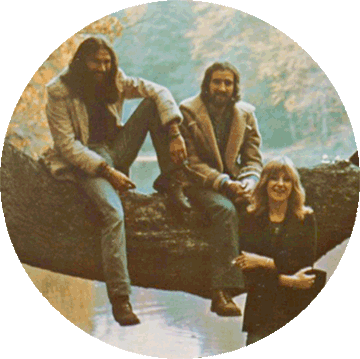
Dave would later describe his contributions to the group as "minimal" but it was during the recording of the next Fleetwood Mac album in the spring of 1973 when Dave Walker was fired from the band - barely a year after he joined. Apparently, the main reason for this was due to Dave's heavy drinking and spending too much time down at the pub (with John McVie) instead of helping to write songs for their next album!
Ironically, Dave Walker's next musical project was a line-up called "Hungry Fighter" that was formed around former Fleetwood Mac member Danny Kirwan who Dave had replaced in that group. From the outset, this band that also included ex Young Blood drummer Mac Poole, was dogged by bad luck made worse by Danny's precarious mental health state. Their first gig was preceded by a serious road accident, destroying their equipment and badly injuring a roadie. The headline band on the same bill refused to let them borrow their gear.
Dave Walker's next few groups fared little better. Having relocated to San Francisco, California in 1974 with his American born wife, he was involved with a line-up called "Raven" that were led by psychedelic rock band "Quicksilver Messenger Service" guitarist John Cipollina. Dave performed with them around the San Francisco area but with John Cipollina also involved in other projects, the group was never a full-time proposition.
Before the end of 1976, Dave Walker, along with other members of Raven, formed a new band called "Mistress" and Dave was back to writing songs again. They made some studio demos with the aim of securing a record contract but the line-up wasn't stable which included their guitarist leaving to join the Steve Miller Band. It was while Dave was fronting Mistress when "Black Sabbath" guitarist Tony Iommi called to see if he'd be interested in replacing their singer Ozzy Osbourne!
Black Sabbath
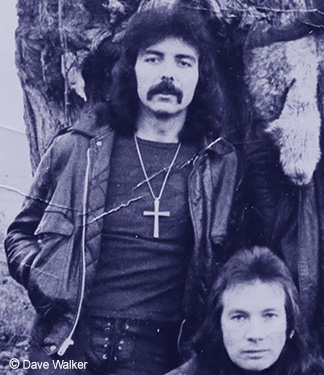
It was late autumn of 1977 and Birmingham's legendary heavy metal band Black Sabbath were due to record their next album. After booking expensive studio time, Ozzy Osbourne suddenly left the group and no one knew when he would return if ever. Tony Iommi said; "Me and Bill Ward knew this singer Dave Walker from the time he was in a local band called The Redcaps. I remembered him having a good voice so we got in touch with him".
Dave flew back to the UK and along with Tony Iommi started writing songs for the new Black Sabbath album. A freshly-shaved Dave Walker also made a live television appearance fronting the band on the locally produced BBC West Midlands TV program "Look Hear" at Birmingham's Pebble Mill studio on January 6, 1978. They performed their classic 'War Pigs' and a new song called 'Junior's Eyes' that had been written with Dave and on which he also played harmonica.
Unfortunately for Dave Walker, Ozzy Osbourne returned to the group a short time later following the death of his father and so Dave missed out on recording and touring with Black Sabbath. Dave arrived for a rehearsal and was told to wait while the band went for a meeting (at the local pub). It was drummer Bill Ward who gave Dave the bad news and said; "We're still here and you're not". Ozzy refused to sing any of the lyrics to new songs written while he was away and so bass guitarist Geezer Butler had to re-write them before they were recorded for what became the group's final album with Ozzy titled "Never Say Die!"
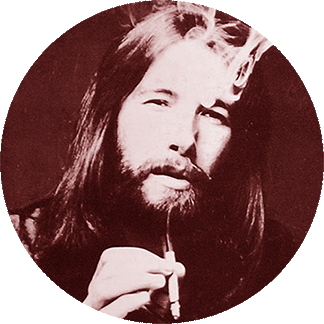
Dave said; "I returned to the USA and basically became a shiftless hippie for a few years, working on ranches and doing a lot of menial jobs - construction, kitchen work, etc. In fact, I don't think you can call yourself a blues singer if you haven't had a few dish washing jobs!"
In 1981, Dave Walker decided to form his own band that he called "The David Walker Band" and assembled some good musicians. He said; "The band was really excellent. Unfortunately, drugs did have a great influence with a couple of us and along with what I will call bad advice, we narrowly missed a major label deal, and we went our separate ways." A year later, his marriage broke down and feeling somewhat disillusioned he decided to quit the music business.
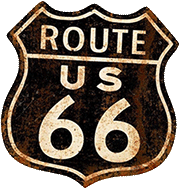
Dave Walker then moved to a small town called Gallup in New Mexico on the famous US highway "Route 66" where it was rumoured he was living with a tribe of indians! However, the actual truth was less romantic. Dave made a living by working on various construction jobs. He said; "The work took me out onto the Navajo reservation a lot and I also had a Pueblo girlfriend for three years. She left me for a cop!"
It wasn't until 1986 that Dave decided to give it another go and joined a new line-up of Savoy Brown at the invitation of their leader and founding member Kim Simmonds. For the next several years Dave Walker went out on the road and recorded a few albums as part of the latest Savoy Brown line-up.
While the band toured the US and Canada extensively and were well received, they could not quite recapture the height of popularity they experienced during their 1970s heyday. Before the end of 1991, Dave decided he'd had enough of a "life on the road" and so left the band for a second time - and this time for good.
The Dave Walker Band
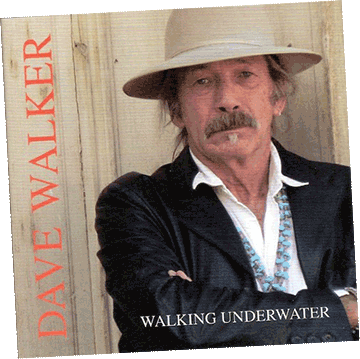
Following his departure from Savoy Brown, Dave Walker moved to Bozeman, Montana where he still lives to this day. Since then he has participated in a psychedelic-sounding line-up called "Donovan's Brain" lead by guitarist Ron Sanchez who was an old friend from the time that Dave lived in San Francisco. They built up a small but loyal following and recorded a few albums.
In 2007, Dave recorded his own first solo album titled "Walking Underwater" and has since formed his own "Dave Walker Band" with whom he continues to perform locally. Dave has also made guest appearances on various recordings by others during the last few decades.
For David Walker, it has been a mighty long road from the time he first saw Elvis Presley on the television set at his grandparent's house back in Walsall, West Midlands, and formed a rock 'n' roll band with his brother Mick. While not quite becoming a household name in his chosen career (although he certainly came close), most of us can only imagine such a colourful journey with so many memorable stops made along the way.
Copyright © John R Woodhouse
Sources: 'The Harmony Illustrated Encyclopedia of Rock' third edition - book various authors 1982; 'Fleetwood Mac - The Definitive History' book by Mike Evans 2011; 'The Complete History of Black Sabbath' book by Joel McIver 2016; 'Tony Iommi Iron Man' book by Tony Iommi with assistance from T.J. Lammers 2011; Thanks also to Brian Nicholls and Mick Walker. Some selected quotes are from DMME.net 'Let It Rock' Interview with Dave Walker May 2008.